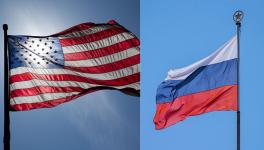What About India’s Pending Cases in WTO?
Image Coutesy: WTO
The World Trade Organisation’s (WTO) Dispute Settlement Body (DSB) will soon come to a standstill with President Donald Trump officially declaring that the United States would block the reappointment of Shree Baboo Chekitan Servansing, a serving Appellate Member from Mauritius, who demitted office on September 30, 2018. At present, the world trade court is stuck with only three judges. Seven judges are appointed to the Dispute Settlement Body (DSB) who go on to serve four-year terms. Although there is no restriction for the reappointment of a member, given the nonpartisan set-up and staggered terms resulting in different appointment times, this blocking of appointments and reappointments by one country could lead to a slow and eventual demise of the multilateral trade body.
While the required mandate for any case to be heard is a quorum of three judges, having a healthy roster of seven judges who serve in a rotational capacity makes a fit case for all the seats to be full. Moreover, given the nature of trade cases that are submitted to a panel leading to an appeal that is heard by the Appellate Body, it is crucial that the members are specialists in international trade and will make an impact bilaterally and regionally as they award concessions or authorise suspensions. It is also the only international agreement that has teeth to authorise a state to impose sanctions on the losing country, unless the parties have decided to come to a settlement, which would mean a no win or lose scenario.
Currently, the three Appellate Body members are Ujal Singh Bhatia from India, who was reappointed in December 2015 until December 2019, Thomas R Graham from the US, who was also reappointed and whose term ends on the same date as Bhatia, and Hong Zhao from China, whose term ends in November 2020. If no new appointments are made by this year end, the terms of Bhatia and Graham will end, as there is no provision for a third time reappointment. The lone member from China will remain and, as per the rules (DSU Article 17.2), she cannot function.
This has been the purpose of the US to slowly distance itself from a multilateral trading system, as stated by the US Ambassador to WTO, that gives preference for developing and least developed countries, which is known as special and differential treatment, and thereby assist in industrialisation and development, which means that they are exempted from liberalisation obligations, as agreed under the WTO.
The developed countries want a more restrictive approach to the special rules and benefits that the others currently possess. As trade war tensions between major players in the global economy escalate, it is all the more important to have a strong dispute settlement system that will use chambers of law and diplomacy over conflict anxieties and lessen the chances of the US using its veto power to paralyse international efforts to prevent trade protectionism.
The irritation of the Trump administration towards the DSB is unfounded, as most of the dispute cases are won by the US when they filed it. During the Obama administration, all 26 complaints filed were won, a 100% win rate.
What about India’s pending cases?
India currently has 24 cases as a complainant, 25 cases as a respondent, and is involved as a third party in over 150 cases. These cases range across trade, services and every possible industry that is of national interest and economic value. India has 11 cases against the US and the US has seven cases against India, followed by seven cases against the European Union (EU) and 10 cases brought by the EU against India.
As the WTO looks to break away from a consensus-based multilateral rule, making process in its new reform document akin to the World Bank and the International Monetary Fund, it appears that the roadmap for WTO’s 12th ministerial conference to be held in Astana, Kazakhstan, in June or July 2020, will mark the end of the Doha Development Round, already labeled as ‘failed’ talks. In March 2018, as a run-up to the mini-ministerial meet in Delhi, 65 countries, including India, the EU and China asked WTO to begin the process of appointing new judges and fill up the vacancies.
The implicit understanding in international negotiations is that if the US is not on board, the success of the system or treaty is suspect. The US viewpoint was effectively argued by Steven Groves of Heritage Foundation about the United Nations Convention on the Law of the Sea (UNCLOS) -- it is not in US interest to accede to the treaty governing world’s oceans and marine natural resources, due to the fear that any small island state or an injured party can bring a liability claim against US as worldwide consequences for global warming. If this can serve as a case in point, there are several such international agreements where the US has preferred to stay away.
But how can India secure its trade interests and still be a strong proponent of a multilateral trading system despite these difficulties?
The Centre for WTO studies, located within the Indian Institute for Foreign Trade in New Delhi under the aegis of the Ministry of Commerce, is handling the job of enhancing scholarship to strengthen India’s position. However, given a crumbling system, one must go beyond WTO to ensure India’s vital interests are protected and a distortion in regional or multilateral trade is averted.
While trade diplomacy has always been the mainstay and a key driver of India’s foreign policy, levers such as investment, trade in services, agricultural production, small-scale industries and their attendant intellectual property innovations and their rights need to be protected. As James Nedumpara has argued, India should build its legal capacity in WTO law and more generally in international law to impress upon the judicialised WTO system and can participate, resist and recursively shape the transnational legal order in trade.
Pendency of cases at WTO due to a crises in appointments should be addressed and the deepening divide between the developed and developing countries since the Uruguay Round needs to be solved.
The writer is an LLM Candidate, South Asian University, Chanakyapuri, New Delhi. The views expressed are personal.
Get the latest reports & analysis with people's perspective on Protests, movements & deep analytical videos, discussions of the current affairs in your Telegram app. Subscribe to NewsClick's Telegram channel & get Real-Time updates on stories, as they get published on our website.























